Alloy wheels are more durable and easier to maintain than their older pure metal counterparts, however like everything else in your car, they also need to be cleaned regularly to avoid corrosion. Learning how to clean alloy wheels is a handy maintenance tip you can perform in your own garage with easy to find tools.
Wheels can get stained and corroded from brake dust, and even road salt and cinders used to treat icy roads.
Even extremely stained wheels can be restored to their spotless shine with this comprehensive guide on how to clean alloy wheels, including everything you need to know about alloy wheels.
Contents
What is “Alloy Wheels”?
You might get curious as to what exactly is an “alloy wheel”. Alloy is a combination of two or more metals. This means steel is also an alloy itself, since steel is a combination of at least two elements: one is metal and the other is non-metallic.
There are different types of alloy wheels and different coatings. Learn the difference so that you know how to clean alloy wheels correctly and effortlessly.
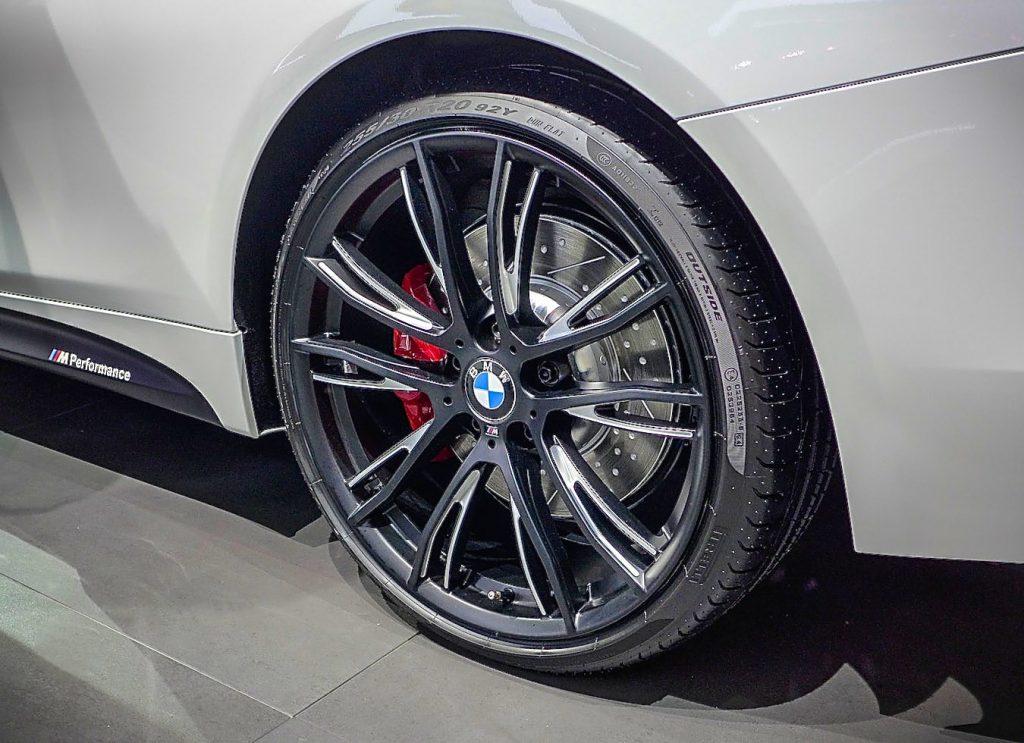
Types of Alloy Wheels & The Difference In Shine
Most cars manufactured today come with the standard alloy wheels. They are also called aluminum wheels, which are made from a blend of aluminum and nickel.
They are more appealing to the eyes than steel wheels, but much more lightweight yet strong and durable. Lower weight means less suspension on your car, better acceleration and higher fuel economy.
There are two types of alloy wheels: cast aluminum wheels and billet aluminum wheels. Cast aluminum wheels are made by pouring molten aluminum into a mold, while billet aluminum wheels are made from a solid piece of aluminum.
When you clean and polish alloy wheels, keep in mind that with cast wheels, they can be polished but you can never make them shine like chrome, so don’t try. Billet wheels, in contrast, can be polished until they look like chrome.
Alloy wheels coatings
You will need to consider which cleaning solution to use and the polishing techniques based on the wheels’s finish
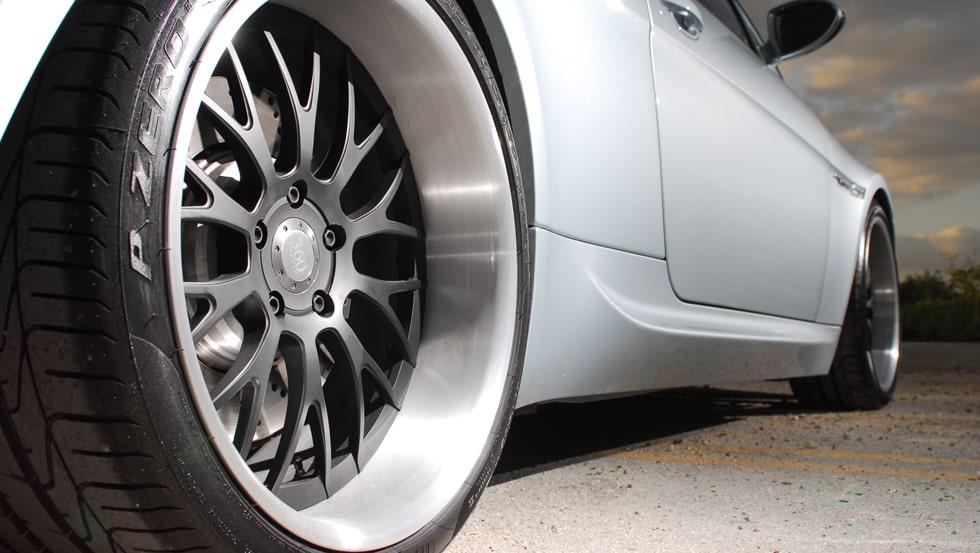
While clear coated alloy wheels are the most common, your car might have bare aluminum alloy wheels. In some cases, drivers enhance their car with aftermarket polished alloy wheels.
With coated and polished alloy wheels, you must not use acidic cleaning solutions as they will eat away the finish on top. Read on to find out the specific brands of cleaners safe for these types of alloy wheels.
Alloy Wheels vs Steel Wheels
Alloy wheels have been refined to become more and more durable, however in terms of strength and durability, steel wheels still have the advantage: steel is tough and extremely hard to bend.
Since steel wheels are much heavier, they can put a strain on your car’s suspension and other parts, reduce acceleration speed and eat up fuel.
Due to this characteristic, they are used for powerful, heavy-duty vehicles and in winter to provide more traction on slippery icy roads.
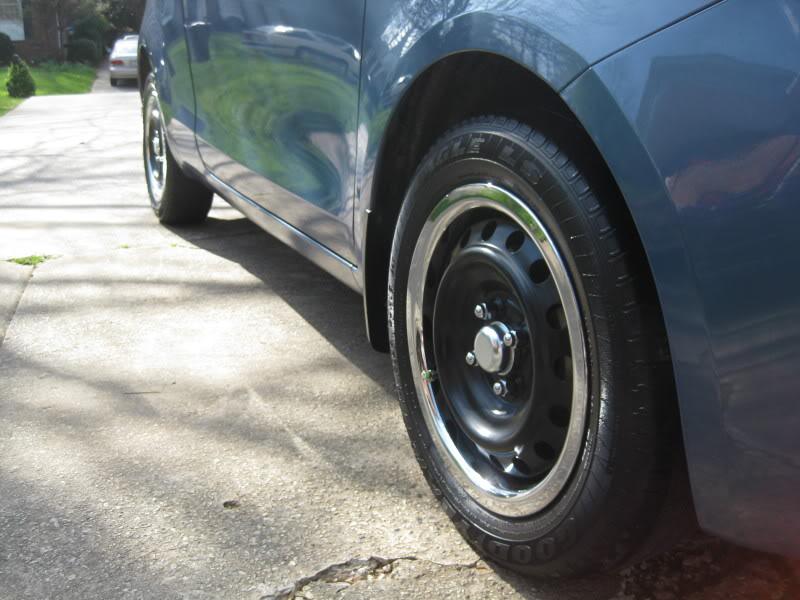
>> READ MORE: Steel Vs. Alloy Wheels- What Makes A Better Choice?
Alloy wheels’s worst enemies
Apart from the regular dust, mud, water and mineral stains, the worst enemy of alloy wheels is actually brake dust.
Brake dust is created every time you use the brakes. When you use the brakes, a component called calipers clamp around the rotors to slow down the wheels. To reduce wear and tear, the calipers have pads which make contact with the rotors.
When the semi-metallic brake pads grind on the cast iron rotors, this creates brake dust which consists of iron particles from the rotors plus carbon residue and metallic elements from the brake pads.
This is not a symptom of failing brakes, however the intense friction and heat created by the wheels when braking makes brake dust highly corrosive. This means you will have to clean brake dust regularly to keep your alloy wheels safe.
How To Clean Alloy Wheels – Cleaning Products
Vinegar and hot water
Vinegar is a handy cleaning solution with natural acids that can deal with many stubborn substances but is not harmless if you touch or smell it. Dissolve some white vinegar into a bucket of hot water as your cleaning solution.
If your alloy wheels are not horrifyingly stained, you can try this easy home remedy. However, do not use vinegar on coated and polished alloy wheels. As noted above, do not use acidic cleaners on these types of alloy wheels.
Oven cleaner
In case you need something stronger than vinegar, you can conveniently grab your oven cleaner, something you might likely find in your home. Oven cleaner can cut through stubborn minerals stain, grease and rust within minutes.
Due to such cleaning power, it’s better to protect your hands and eyes with rubber gloves, goggles and face masks. Perform your cleaning job outside in an open space.
Alloy wheels cleaner
The best way to clean alloy wheels is to grab a specialized cleaning product from Amazon or an auto parts store to combat the toughest stains easily.
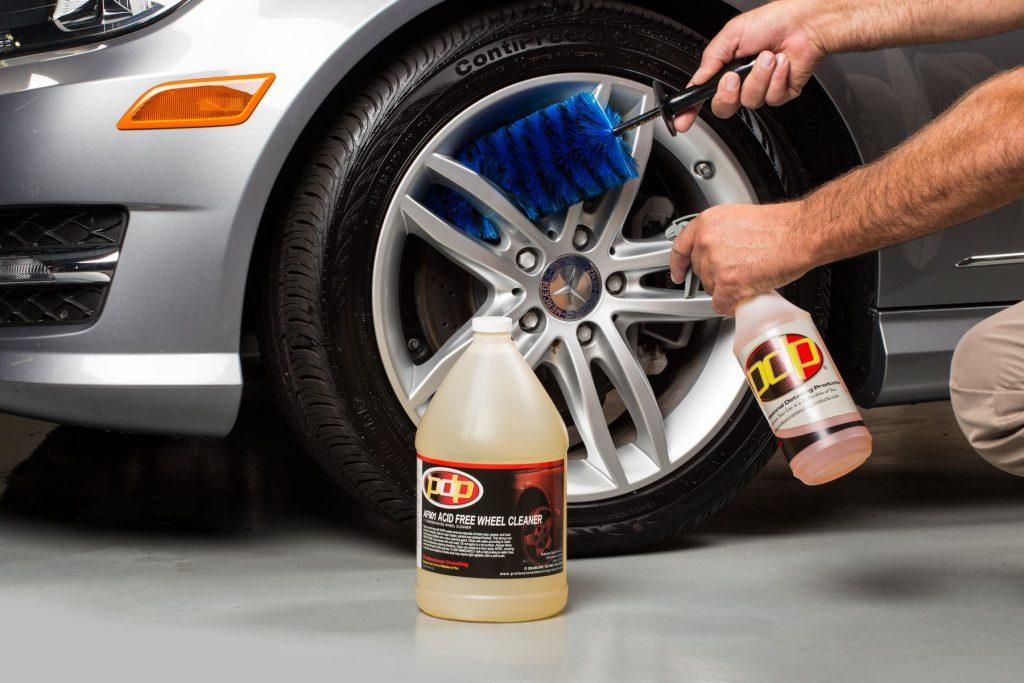
A highly recommended alloy wheel cleaner is Alumin-X polish, which can handle all metal polishing needs: aluminum, stainless steel, chrome, brass or copper.
If your car has coated and polished alloy wheels, only use non-acidic solutions. Some safe choices include SONAX Wheel Cleaner Full Effect, Wolfgang Tire & Wheel Cleaner, and P21S Wheel Cleaners, which cost up to $15 per bottle.
>> READ MORE: How To Clean Car Windows Without Streaks
How To Clean Alloy Wheels – Step by Step
1. Rinse
First, rinse your wheels with a hose to remove loose dirt and brake dust. Make sure to rinse every part, including the interior surface around the barrel.
Best use an adjustable nozzle to remove stuck-on debris with high pressure stream. If you don’t have an adjustable nozzle or pressure attachment, pinch the opening of the hose to create a stronger, more concentrated stream.
2. Soak
If your wheels have plastic hub covers, remove them before performing this task. Spray a generous amount of your chosen cleaning product on the entire wheel, spray extra on stubborn areas.
Let the cleaner soak for at least 2-3 minutes so it will have time to penetrate the caked-on substances. This will make scrubbing later on much easier.
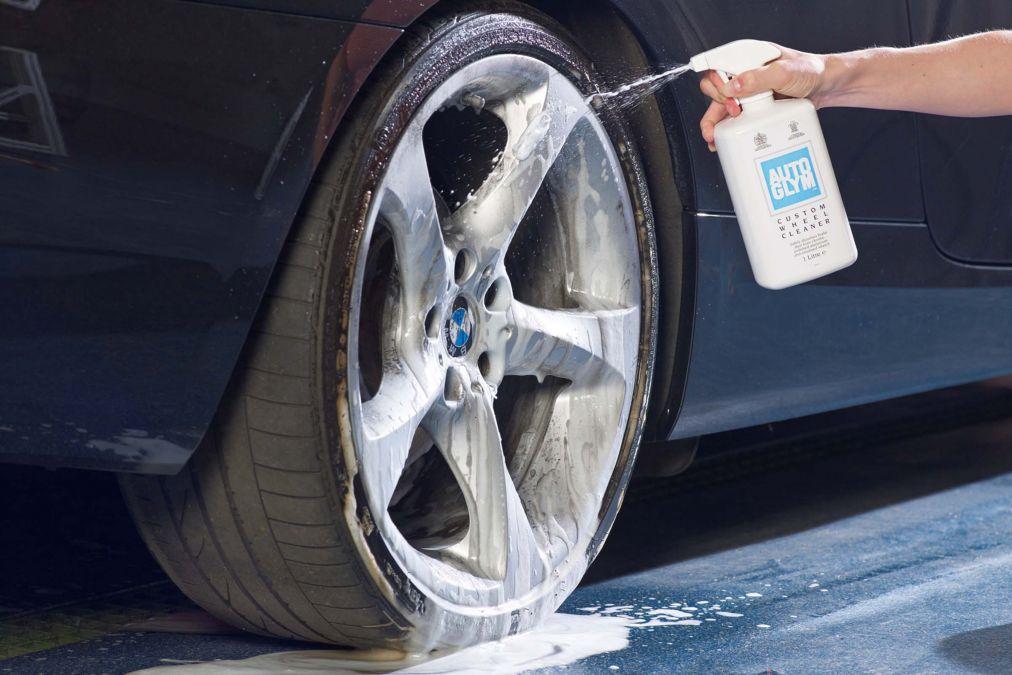
3. Scrub
After soaking, tackle the least stained wheels first and leave the most troublesome wheels later. This will allow more soaking time for the dirtier wheels.
Use a soft bristled brush with flexible stem to easily scrub every corner of the wheel without scratching the wheels’s finish. Reach through the spokes to clean each wheel front to back. Don’t forget the rim screws, where brake dust like to accumulate.
You can use an old toothbrush to do the job. However, since you will be cleaning alloy wheels frequently, it’s best to grab a detailing brush for car cleaning.
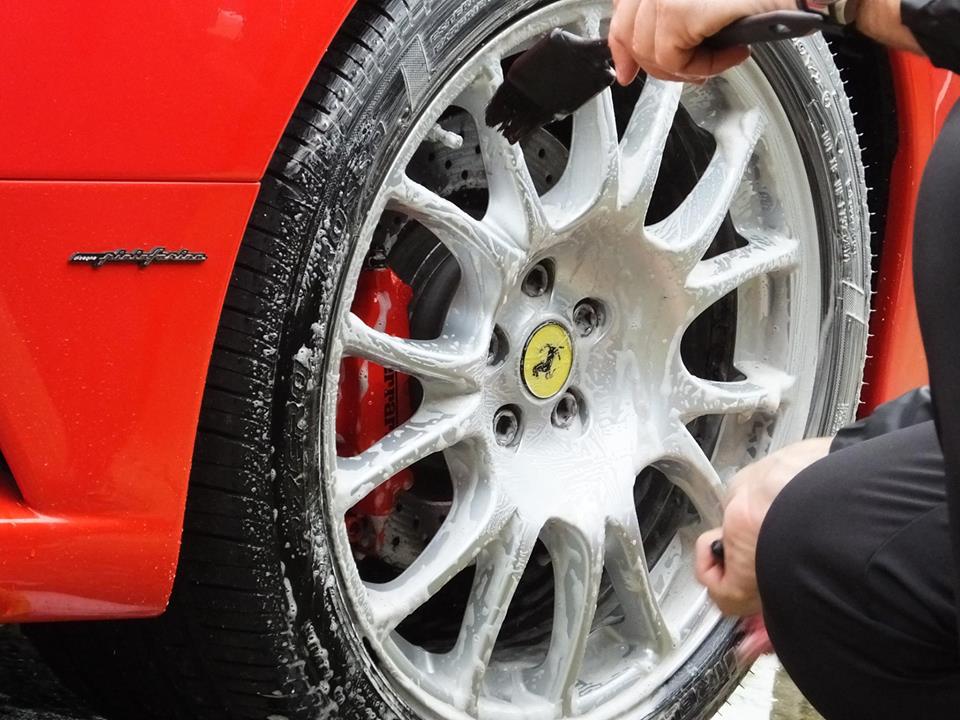
4. Rinse and wipe
Rinse off thoroughly with your nozzle in wide fan mode for better coverage. Make sure there is no cleaner left to avoid dried residue and possible corrosion.
Then wipe the wheels dry with soft microfiber cloth to avoid water stains and avoid leaving tiny scratches on your wheels.
5. Waxing
Applying sealants will give your wheels a glossy, shiny look. More importantly, sealants designed specifically for alloy wheels will provide an extra protective barrier that will make it harder for dirt, dust and debris to stick to your wheels.
Alloy wheels sealants come in wax and spray.
READ MORE:
Use a detailing pad, scoop up some wax sealant and rub it on the entire surface of the wheels. Rub in circular motions until the wax runs clear without leaving any streaks behind.
If you use a spray sealant, hold the spray about 15cm from the wheels to spray on an even coat from top to bottom of the wheels.
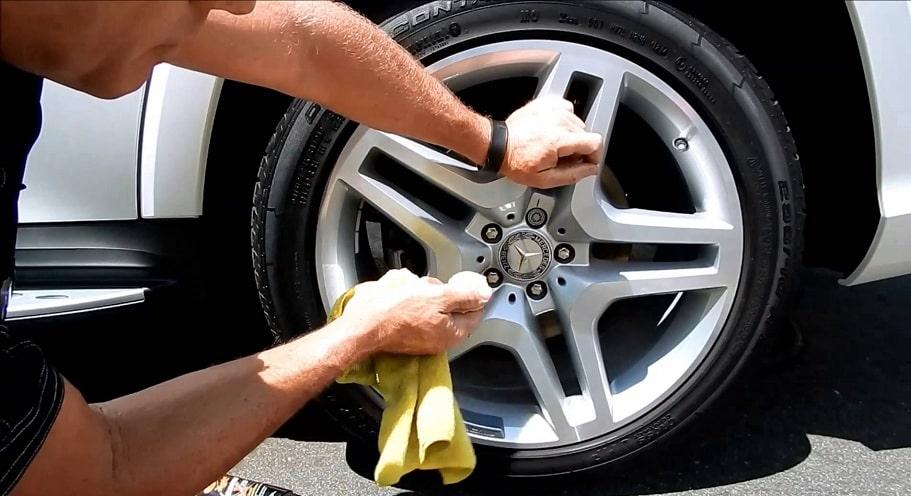
Now you know how to clean alloy wheels at home, remember to take care of your wheels too when providing maintenance to your beloved vehicle.
It’s not just a matter of making your car look clean and new, cleaning alloy wheels regularly will keep it safe from the corrosive brake dust that accumulates all the time when you drive.
Want more hassle-free cleaning tips to keep your baby clean and shiny? Check out this DIY car interior cleaner guide – Make your vehicle sleek and shine.


